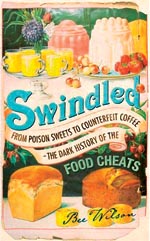Swindled by Bee Wilson
Food manufacturers have been poisoning the public for thousands of years but there’s hope for us yet, says this new book


Swindled Bee Wilson (John Murray, £16.99)
I never thought I would say it, but there may be a case for health and safety regulations. Not the sort that ban conker fights, flower-arranging in church and hanging baskets, but those that control food adulteration. Since the first bread was baked, corn was mixed with chaff, bakers took shortcuts and retailers put their fingers on the scales. In 12,000 years, nothing has changed. The systematic poisoning of the public wasn't always deliberate or villainous. In Roman times, lead was added to wine just because it tasted better when its poisonous nature wasn't understood. Likewise, children's sweets were coloured with copper because they looked better (and sold better).
Then and now, manufacturers were happy to deceive us with adulterations if it improved their profits. Romans added gypsum, lime and seawater to wine; Victorians put flour in mustard and alum in white bread; manufacturers today use false colours and hydrogenated fats, although they know them to be dangerous. Britain has always been bad about controlling adulteration, says Bee Wilson, because of the laissez-faire attitude of succeeding governments.
'The market was god and it was believed by many that...the market would provide... What happened between a man and his baker was no business of the state.' Penalties, compared with the Turkish baker who was thrown in his red-hot oven by a magistrate for adulterating bread, were light. Several heroes emerge: the German Frederick Accum, who used chemistry to identify the food cheats; Arthur Hill Hassell, who found evidence of adulteration under the microscope; and Thomas Wakeley, founder of The Lancet, who named and shamed the cheats. More recently, Caroline Walker publicised counterfeit British food before dying of cancer of the colon (brought on, she thought, by bad food at her public school).
Although the story of Swindled is depressing 12,000 years have not abated humans' greed and inhumanity to each other the authorities now do take the problem seriously. Better still, the public is waking up to the dangers. Caroline Walker's motto was 'Eat whole, fresh food', and that's something, says the author, we can all do. Anyone concerned about feeding their families with poison should read Swindled. The antidote to the cheats, says the author, is: 'Trust your own senses... you know more than you think you do.'
Exquisite houses, the beauty of Nature, and how to get the most from your life, straight to your inbox.
Country Life is unlike any other magazine: the only glossy weekly on the newsstand and the only magazine that has been guest-edited by His Majesty The King not once, but twice. It is a celebration of modern rural life and all its diverse joys and pleasures — that was first published in Queen Victoria's Diamond Jubilee year. Our eclectic mixture of witty and informative content — from the most up-to-date property news and commentary and a coveted glimpse inside some of the UK's best houses and gardens, to gardening, the arts and interior design, written by experts in their field — still cannot be found in print or online, anywhere else.
